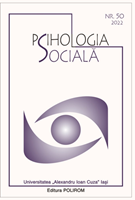Dimensiuni şi consecinţe ale climatului social carceral. O trecere în revistă a modelelor teoretice şi studiilor empirice relevante
Dimensions and consequences of the prison social climate. A review of relevant theoretical models and empirical studies
Author(s): Ioana Florina Marina, Andrei Corneliu HolmanSubject(s): Social psychology and group interaction, Social Theory, Health and medicine and law, Penology
Published by: EDITURA POLIROM S.A.
Keywords: prison social climate; mental health; rehabilitation;
Summary/Abstract: The degree and the ways in which prisoners adapt to the prison social climate are determinant factors of their psychological and behavioral evolution both during imprisonment and after release, influencing their chances of rehabilitation or, alternatively, of recidivism. The present paper presents a narrative review of the scientific literature on this topic, by analyzing three of its facets. Firstly, the paper reviews the fundamental theoretic models on prisonization, i.e., the inma tes’ socialization within the prison subculture. Then, it addresses the psycho social dimensions of the quality of the prison social climate, as they have been highlighted by past studies, mainly those pertaining to the treatment that prisoners receive from personnel and to the interpersonal relation ships between inmates and personnel. The general effects of positive and negative prison social climate, such as those in the area of prisoners’ behavioral problems and motivation towards reha bilitation, are also reviewed. The last section of the paper is focused on prisoners’ mental health and on the specific dimensions of the prison social climate that influence it. It reviews various types of such factors, such as isolation, separation from family, detachment from the injurious influences in one’s personal environment, educational, therapeutic and personal development opportunities offered to prisoners. The studies reviewed support the conclusion that the prison social climate does not necessarily entail a deprivation context that imposes the assimilation of a deleterious culture, with psychological and behavioral effects that would interfere with the correctional aim of the carceral institution. On the contrary, this environment also has the potential to exert positive influ ences, when it offers prisoners a context of personal reinvention, which would foster their abilities to adapt to the world outside prison and, consequently, supports their rehabilitation.
Journal: Psihologia socială
- Issue Year: 2/2022
- Issue No: 50
- Page Range: 177-186
- Page Count: 10
- Language: Romanian
- Content File-PDF

